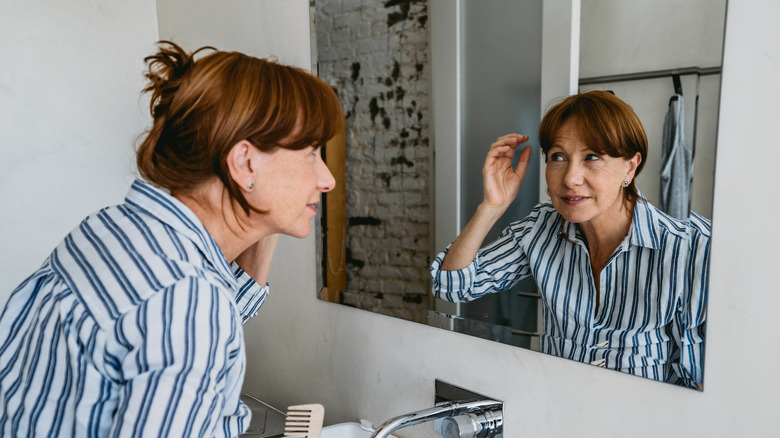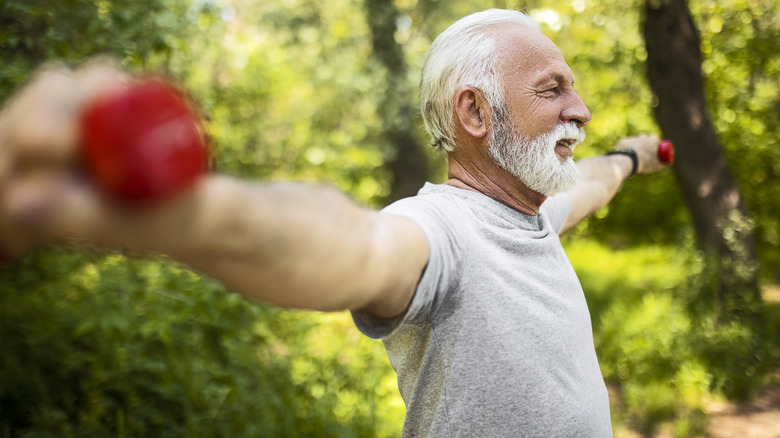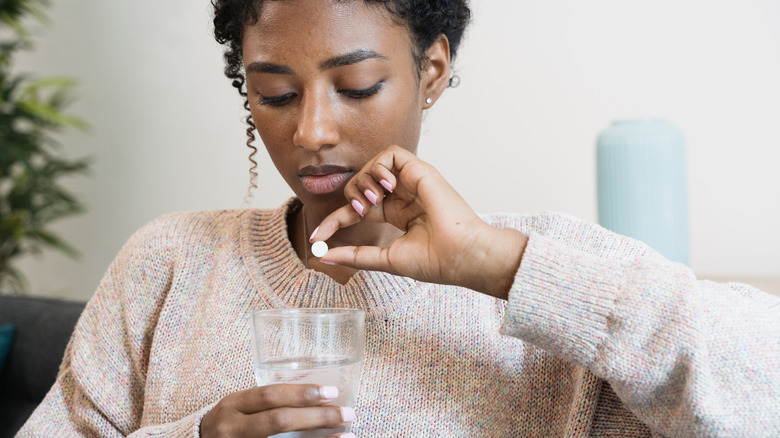The Vitamin Deficiency That's Making You Look Older
It's never a great feeling when someone you know comments on your appearance and tells you that you're looking older now than when they last saw you (rude). Pleasantries aside, most of us might already be doing something to try and slow down aging, whether that involves a healthy and balanced diet, regular exercise, skin products that target fine lines and wrinkles, or abstaining from alcohol and smoking.
Turns out, there is a particular vitamin we can be deficient of that could also be accelerating the process of aging: vitamin D. And it has to do with how this vitamin affects your genes, per Colorado State University. A lot can be unraveled by studying epigenetics (how your behavior or environment could be influencing your genes), according to the researchers from Charité – Universitätsmedizin Berlin involved in a 2020 study, and your biological age is one of them. It might actually be different from your chronological age.
Vitamin D deficiency can cause you to age faster biologically. According to Rhonda Patrick, a cell biologist and co-founder of FoundMyFitness, how vitamin D affects your genes comes down to your chromosomes. Chromosomes are protected from DNA damage by something called telomeres — kind of like how shoelaces are protected from fraying by the plastic tips at the end. "Two epidemiological studies on twins found that those individuals with the lowest levels of vitamin D also had the shortest telomeres and this telomere shortening correlated to five years of biological aging," explained Patrick. Shorter telomeres have been linked with aging and chronic illness.
The link between vitamin D deficiency and frailty
You know how older people tend to look thinner, have weaker grip strength, experience more exhaustion, and have low levels of activity, including slow walking speeds? There is some science to support the theory that not getting sufficient vitamin D could make someone more fragile sooner.
A 2020 study published in the journal Nutrients done on mice found that low levels of vitamin D could cause someone to become frail. Granted that this is an area that has to be tested more expansively and on humans, first author of the study, Kenneth L. Seldeen, told Medical News Today, "We found that in aged mice, low levels of vitamin D [resulted] in physical declines, such as reduced grip strength and grip endurance — the ability to sustain a grip — and that they started developing as soon as 1 month after reduction of vitamin D intake."
Interestingly, the study also found that consuming more than what's recommended (hypersufficient intake) is what contributed to less frailty. What does this mean for vitamin D intake? Just how much should we be consuming to avoid vitamin D deficiency?
How much vitamin D is enough?
The question of just how much vitamin D you need has a nuanced answer that's definitely not one-size-fits-all. The recommended daily intake by the National Academy of Medicine is 600 international units (IU) for people aged 19 to 70 and 800 IU for those over 70 years of age. IU is the pharmacological system used to quantify vitamins, hormones, and toxins.
According to Columbia University Irving Medical Center's Dr. John Bilezikian, you might be at your lowest vitamin D levels during the winter months. We get a considerable amount of our vitamin D when our skin produces it when exposed to UVB radiation. This ability reduces as we age. But sun exposure is a double-edged sword. Over-exposure to the sun and exposure without adequate sun protection (sunscreen, hats, etc.) have also been linked to older-looking skin.
A more sustainable (and safe) way to approach vitamin D intake is to focus on your diet. Foods rich in vitamin D include fish like salmon, mackerel, swordfish, trout, and sardines, vitamin D-fortified plant-based and dairy milks and yogurts, fortified cereals, mushrooms, eggs, and beef liver. You may want to think about supplementing (especially during the winter), but meet with your healthcare provider and have your vitamin D levels tested before doing so. As scientist João Pedro de Magalhães told Business Insider, "You have to find that balance between enjoying life and living healthy that will allow you statistically — in all likelihood — to live longer."



